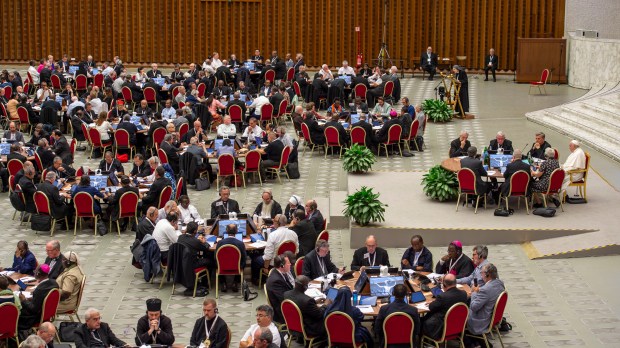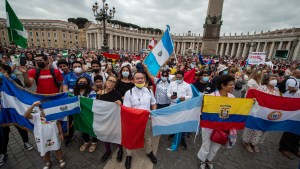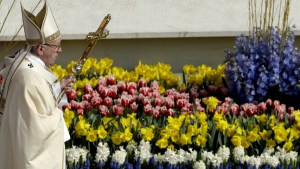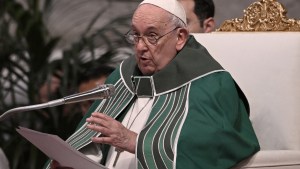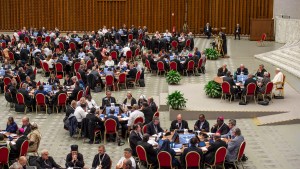On the evening of October 28, 2023, the members of the Synod on Synodality voted on a Synthesis Report to guide the Catholic Church in its reform until the next and final session of the Synod in October 2024. The 37-page text proposes ways to make the Catholic Church more participative, and puts forward concrete proposals on sometimes burning issues.
Note: This article was prepared before the Vatican released the official English translation of the report, which can be found here.
At a press conference held shortly after the report was released in Italian, Cardinal Jean-Claude Hollerich, the Synod’s rapporteur, emphasized that all 273 paragraphs had been approved by a two-thirds majority of the 344 Synod members present in the room, including lay men and women.
The question of the female diaconate
This was undoubtedly the question that the synod fathers and mothers debated most. Nearly 20% of them (69 against 277), for example, opposed the article mentioning “diverse positions concerning the access of women to the diaconal ministry.” Throughout the document, the assembly asks how the Church could “insert more women into existing roles and ministries,” and, “if new ministries are needed, who should make the discernment, at what level and in what way?”
Aware that this is one of the major issues for some participants in the synod, which has heard the concerns of faithful from all over the world, the members wish to “ensure that women can participate in decision-making processes and assume roles of responsibility in pastoral care and ministry” — even if it means “adapting canon law accordingly,” they write.
On the hot topic of the female diaconate, the assembly was divided among those who consider that it would be “unacceptable as it would be discontinuous with Tradition,” those who believe that it would “re-establish a practice of the original Church,” and those who see it as “an appropriate and necessary response to the signs of the times.” Others fear “a dangerous anthropological confusion, in which the Church would align itself with the spirit of the times.”
Among the concrete proposals, the document calls for “further theological research” on this issue, drawing in particular on the results of the commissions set up by the Pope in 2016 and 2020, as well as the theological, historical, and exegetical research already carried out. They would like the results to be presented at the next session of the assembly, implying that in this way this discussion could move forward.
Other women’s issues addressed by the Synod
Finally, the document makes other proposals in favor of women: an end to unjust remuneration, especially regarding consecrated women; the use of language that emphasizes the equality of men and women in liturgical texts and Church documents; the participation of women as “judges in all canonical processes”; and the presence of women formators in seminaries.
Lay preachers and a ministry for married couples?
The Synod calls for “greater creativity in the institution of ministries based on local requirements.” It suggests broadening the functions of the ministry of lector, which Pope Francis opened up to women in January 2021. It proposes that it could become “a true ministry of the Word of God” that could include “preaching.”
The synod fathers and mothers also envisage a new ministry for married couples, to “support family life” and “accompany those preparing for the sacrament of marriage.”
A ministry of listening to those who feel excluded from the Church
Synod members were expected to address in particular the sensitive issue of accompanying those with homosexual attraction. According to our information, the term “LGBTQ+” was part of the first draft, but was not retained in the final report.
The members spoke more generally of “people who feel marginalized or excluded from the Church because of their marital status, identity, and sexuality [and who] also ask to be heard and accompanied, and for their dignity to be defended.”
The document states that “listening requires an unconditional welcome,” but immediately makes it clear that this does not mean renouncing “clarity in presenting the Gospel message of salvation, nor approving just any opinion or position.”
The synod fathers and mothers propose “to institute a ministry of listening and accompaniment based on baptism, adapted to different contexts.”
The document makes no mention of the possibility of blessings for same-sex couples, a request that had been made by the German Synodal Way in particular.
Mandatory episcopal councils and bishop accountability
At present, two bishop’s councils are mandatory in a diocese: the council for economic, social, and legal affairs, and the presbyteral council, which represents all the priests in the diocese. The Synod also wishes to make mandatory the “episcopal council,” made up of the vicars general and episcopal vicars, as well as the “pastoral council,” which is supposed to represent the whole diocese, bringing together clerics, religious and lay people.
Likewise, the Synod calls for “structures and processes” to be put in place for regular evaluation of the bishop’s work, in terms of the “style of his authority, the financial administration of diocesan assets, the functioning of participatory bodies, and protection against all kinds of abuse.”
“A culture of responsibility is an integral part of a synodal Church that promotes co-responsibility, besides constituting a possible protection against abuse,” the Synod members insist.
Explaining that many bishops experience “an overload of administrative and juridical commitments” and must confront “a crisis of his authority” in secularized societies, the report recalls that “the delicate question of the management of abuse confronts many bishops with the difficulty of reconciling the role of father and that of judge.” The text calls for an evaluation of “the advisability of entrusting judicial responsibility to another body, to be specified canonically.”
Selection of bishops reviewed, work of nuncios evaluated
“The Assembly calls for a revision of the criteria for selecting candidates for the episcopate, balancing the authority of the apostolic nuncio and the participation of the episcopal conference,” write the members of the Synod. Also, the work of the “pope’s ambassadors” in the world is sometimes judged too opaque.
The Synod calls for wider consultation in the choice of bishops, “listening to a greater number of lay men and women, consecrated and non-consecrated people, and taking care to avoid inappropriate pressure.”
In addition, a short proposal could imply a vast cultural change within Vatican diplomacy if the measure were to see the light of day. The members consider it “opportune to provide for forms of evaluation of the work of pontifical representatives by the local Churches in the countries where they carry out their mission, in order to facilitate and perfect their service.” At present, apostolic nuncios are accountable only to Rome.
Strengthening episcopal conferences
Taking up a theme addressed by Pope Francis at the start of his pontificate, the report calls for “further deepening of the doctrinal and juridical nature of episcopal conferences, recognizing the possibility of collegial action also in relation to doctrinal issues that emerge at the local level.”
Some issues could be dealt with at continental level. A concrete example of addressing such a topic mentions the Symposium of Episcopal Conferences of Africa and Madagascar (SECAM), invited to “promote theological and pastoral discernment on the theme of polygamy and the accompaniment of people in polygamous unions who are drawing closer to the faith.” This very specific and complex issue gave rise to 43 opposing votes.
The wealth of priests and the question of celibacy
The question of the “disciplinary obligation” of priestly celibacy was raised, especially in regions where “ecclesial and cultural contexts make it more difficult.” This theme “needs to be taken up again at a later date,” it says. With 55 votes against, this question was one of the least agreed upon among Synod participants.
The report does, however, emphasize the “prophetic value and witness of conformity to Christ” of priestly celibacy. It expresses the “gratitude” of Synod participants for deacons and priests, “who can experience loneliness and isolation.” Christian communities are asked to support them with “prayer, friendship and collaboration.” On the subject of permanent deacons, the members invite an evaluation of the implementation of this ministry after the Second Vatican Council.
The document stresses the importance of combating “clericalism,” the fruit of a “misunderstanding” that leads people to see the priesthood as “a privilege” rather than a “service.” Clergy training must therefore “avoid the risks of formalism and ideology, which lead to authoritarian attitudes and prevent true vocational growth.”
Making the Eucharist understandable to local cultures
The synthesis report recalls that “the celebration of the Eucharist, especially on Sundays, is the first and fundamental way in which the Holy People of God gather and encounter one another.” This experience links several dimensions: “unity of the Church and multiplicity of Christian communities; unity of the sacramental mystery and variety of liturgical traditions; unity of celebration and diversity of vocations, charisms and ministries.”
In line with the 2019 Synod on Amazonia, the document reiterates the importance of “making liturgical language more accessible to the faithful and more embodied in the diversity of cultures,” with greater responsibility given to episcopal conferences to propose local adaptations, without “calling into question continuity with tradition.” The report also stresses the value of simple celebrations of the Word and popular piety, notably Marian devotion.
Perennial continental assemblies
The report looks at the various models of assembly that local churches have tried out in recent years. It mentions in particular “the First Ecclesial Assembly of Latin America and the Caribbean,” “the People of God bodies in Brazil,” and “the Australian Plenary Council,” but makes no mention of the German Synodal Way.
The report also raises the need for a “canonical configuration” of continental assemblies to incorporate “the variety of God’s faithful people.” Coordination organisms between bishops from different countries are also encouraged, with the creation of international ecclesiastical provinces, for example.
A common Easter date and an Ecumenical Synod on Mission
A number of proposals are also being drawn up in the ecumenical field. For example, the assembly expressed a “strong desire” to find a common date for Easter, so that all Christian confessions can celebrate Christ’s resurrection on the same day. For the time being, Catholics follow the Gregorian calendar, while the Orthodox follow the Julian calendar.
Other ecumenical proposals include involving Christians of other denominations in the Synod, as well as convening an “Ecumenical Synod on common mission in the contemporary world,” and creating an ecumenical martyrology. A step in this direction has already been taken by the Pope, who last May announced the addition of the Coptic martyrs of Libya to the Catholic martyrology.
Synodality: A busy agenda for the future
With a view to the second session scheduled for October 2024, the Synod — whose composition is expected to remain unchanged — proposes the establishment of an “intercontinental commission of theologians and canonists” to clarify “the implications of synodality” in terms of canon law.
It is also hoped to pursue community discernment on “controversial doctrinal, pastoral and ethical issues.” It’s a busy schedule for the next 11 months, and one that the Synod organizers intend to keep to, since “the synodal perspective represents the future of the Church,” says the summary.
